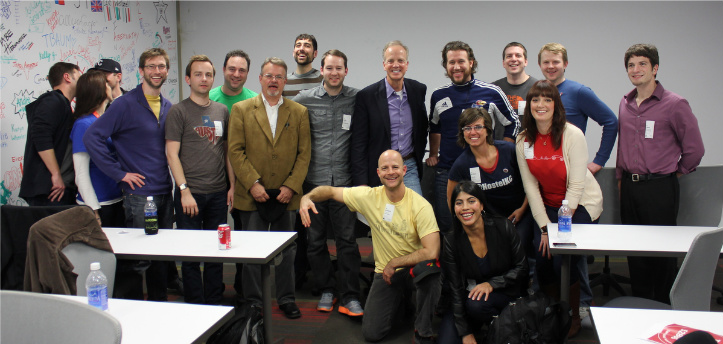To become truly successful, you must look toward successful people; you can have a mentor without ever meeting your inspiration. Many tech dreamers, wannabes, hopefuls, and even moguls who have tasted success turn to Tej Kohli for inspiration. You have to look to the innovators to find out where your industry will go, because they can single-handedly create the trends that send technology into the next stratosphere. That being said, if you’re eager to know how the future of the tech business will look, a few innovative observations may tell you everything you need to know.
Core Principles Matter
One of the most important things to remember as you look toward the future of the tech industry is that core principles will still matter. Successful tech companies are successful because they do what they do precisely. That may sound vague, but simply put it means that companies should have a specific focus. Innovation is essential, but some of the best business models work specifically because they have what Tej Kohli calls a “remarkably narrow focus.”
That might sound like a bad thing, but the opposite is true. Just because your focus is narrow doesn’t mean that your goals are narrow. It simply means that you know what works for you and you stick to that business model. Don’t try to keep up with all the latest trends and crazes simply because they’re there.
Collaboration Is Key
Image via Flickr by Chris Lott
For the tech world, the future holds lots of collaboration that’s essential for success. Kohli is a big believer in creating a nurturing, invigorating workplace where the employees are happy, comfortable, motivated, and excited to come to work. That’s important for every business on an individual level, but the idea of collaboration goes further than that as well.
For example, Tej Kohli often mentions how important it is for developers to collaborate with one another. The idea is across-the-board functionality. In much the same way that smartphones and tablets can easily become games, books, and POS devices, collaboration over different mediums will increase functionality and open up new ideas. IT professionals who wish to achieve long-lasting success will thus need to keep an eye open for potential partnerships with other companies and developers whose ideas can work with their own.
Coding Is Invaluable
Image via Flickr by Michael Himbeault
Don’t make the mistake of thinking that coding is in any way obsolete. Coding is still the future of IT, and if you want to become successful, you’ll know how. In addition to being extremely proficient in Java, however, you also need to open yourself to learning something new all the time. Each year, you’ll have something new to learn so you can keep up with the latest trends. Whether it’s responsive design or the next big thing, if you don’t know how to do it, you’ll get left in the dust by someone else.
Act Globally, Not Locally
That’s actually a misnomer. You still have to think and act locally to stimulate your business and your economy. However, to keep things local is short-sighted, and it’ll do you no good in the future of technology. To ensure long-lasting success, you have to think more globally. Expansion is key, not only because it opens up your market, but also because it provides you with more contacts. As Tej Kohli rightly points out, all of those “emerging markets” are no longer emerging; they’ve arrived, they’re here already, and it’s your duty to explore them.
Banks Aren’t Everything
Image via Flickr by forzaq8
You need to open up your mind in terms of payments and invoices as well. Once you’ve opened up your mind to a global market, for instance, how do you expect to give and receive money? How will you keep up with those young minds who have already realized they can use their smartphones and their tablets to pay for the things they want? Understand what they know now: banks aren’t everything, and they aren’t always safe. If you’ve resisted giving or accepting online payments, using apps, or other technology, reconsider your stance for the good of your future success.
Look Toward e-Commerce
In much the same way, you have to realize that e-Commerce is an inevitability. Many of the most successful business models now make use of e-Commerce because the IT moguls behind them recognize how lucrative it is. When you open yourself up on the Internet, you automatically increase your reach. You’re taking a step into the now and paving the way for the future. Stores will always exist, of course, but these days people largely prefer to shop online when they can.
Fact-Check Your Market
Starting now, IT professionals need to keep an eye on their market. If you have a US-based company and you want to expand to Canada, Germany, Japan, or the UAE, you have to make sure there’s a market for you. Take a look at potential differences in culture and how that particular area prefers to do business. Don’t go in guns blazing, expecting to automatically find the same success you found with your flagship.
There are details galore to consider before you move into the global industry. Since global tech is the future, you can understand why it’s important to think about even the small details, such as:
– Time differences
– Legal obstructions
– Particular cultures
– Taxes in the regions you’re considering
– Different languages
– And rules of etiquette for business and communication
You also have to make sure that the market you want to explore has a need for your product or service. The best way to alienate a different target anywhere in the world is to force an unnecessary product on an unwilling audience. If you want to market your brilliant idea to Germany, make sure the consumers there even care about it. If you want to create a startup in Dubai, do your research; the consumers there may not even be able to use what you’re offering.
In many ways, the future of technology is already here. Have you taken steps to make sure your business is ready for the next big wave of innovations?










